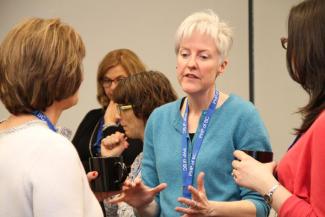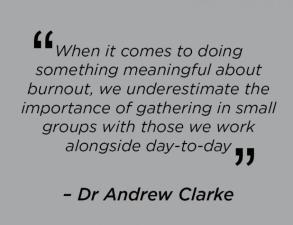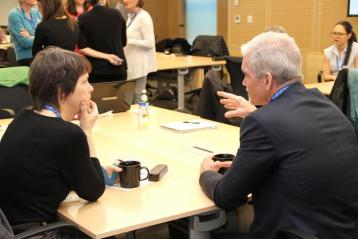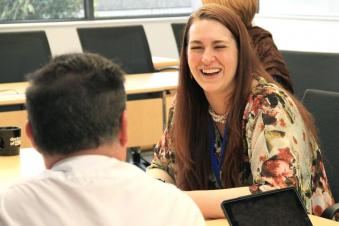- Managing your Practice
-
- Your Benefits
-

Introducing the ultimate Club MD experience
From work to play, and everything in between, we provide you with access to hundreds of deals from recognizable, best-in-class brands, elevating every facet of your life – from practice supports to entertainment, restaurants, electronics, travel, health and wellness, and more. Your Club MD membership ensures that these deals are exclusive to you, eliminating the need to search or negotiate.
Welcome to the ultimate Club MD experience. Your membership, your choices, your journey.
-
- Advocacy & Policy
-
- Collaboration
- News & Events
-

Stay Informed
Stay up to date with important information that impacts the profession and your practice. Doctors of BC provides a range of newsletters that target areas of interest to you.
Subscribe to the President's Letter
Subscribe to Newsletters
-
- About Us
-
Helping to meet the challenge of physician burnout
April 13, 2018
News
Almost 50 physicians from Divisions of Family Practice and Medical Staff Associations made their way into the Doctors of BC offices in Vancouver. Many had never set foot in the building before. They were brought here by a common cause - to help find solutions to the rising rate of physician burnout.
 All of the attendees are physician wellness champions representing their organizations, many of whom are making the health and wellbeing of physicians a priority. The day-long gathering reflected the commitment of Doctors of BC and the Physician Health Program to supporting physicians to meet the growing challenge.
All of the attendees are physician wellness champions representing their organizations, many of whom are making the health and wellbeing of physicians a priority. The day-long gathering reflected the commitment of Doctors of BC and the Physician Health Program to supporting physicians to meet the growing challenge.
We spoke with Dr Andrew Clarke, Executive Director of the Physician Health Program, to learn more about the event.
Dr Clarke, what is burnout and why are we seeing an increase among physicians?
Burnout is a psychological response to chronic, unrelenting occupational stress. It features exhaustion, cynicism and a feeling of disempowerment, a sense of doubting yourself, wondering why you became a doctor in the first place.
 Rates of physician burnout have been rising over the last 10 years. More and more physicians are feeling chronically stressed as pressures build up within the health care system. Another contributor is the pace of change. In some ways change is happening too slowly, in other ways, it’s happening too quickly. For example, many physicians feel overburdened with paperwork, while others feel stressed by the introduction of EMRs.
Rates of physician burnout have been rising over the last 10 years. More and more physicians are feeling chronically stressed as pressures build up within the health care system. Another contributor is the pace of change. In some ways change is happening too slowly, in other ways, it’s happening too quickly. For example, many physicians feel overburdened with paperwork, while others feel stressed by the introduction of EMRs.
Do doctors have more trouble coping with burnout than those in other professions?
Yes, they often do. Doctors place a lot of value on autonomy, and we don’t want to lose that. But autonomy without connectedness is just plain lonely.
And when you take our tendency to “go it alone” and place it in a context of prolonged stress, we tend to turn on one another rather than coming together. Instead of helping each other through a stressful time, we tend to blame other people or ourselves. These are the components of burnout that get less attention.
 What if anything can be done to help?
What if anything can be done to help?
Dr Michael Leiter, one of the world’s foremost experts on burnout, gave an excellent talk at our event about his research.
He noted that burnout is not just feeling tired and it is different from depression. What I found very hopeful about his talk was that it is possible to do something about burnout. His research shows that a big part of the solution lies in how we treat each other in the work place.
Lately we’ve heard a lot of people call for systemic change, to get at the chronic stressors that are at the root of the problem. Counselling is also important to build resilience and develop coping strategies. And they are both very important. But what we often overlook, and what Dr Leiter’s research emphasizes, is the importance of civility and respect - offering empathy and compassion to those we work with every day, even in the face of chronic, unresolvable stress.
Was that part of your goal in holding the event?
Right now in BC we have 69 MSAs and 35 Divisions – almost all of them are doing something to support physician wellness. It’s great that they each have the capacity to do what’s best locally, but there is the potential to miss opportunities for collaboration.
This event was our attempt to start a range of different conversations among the local wellness champions in each organization. We want everyone to know what others are doing, and to get inspired to collaborate in the future.
Our goal is to create a community of practice in the truest sense of the phrase, that brings together people who work on physician health and wellness in separate grassroots organizations.
Can you give us an example of some great work that is being done in BC?
There are many examples, but one of the most inspiring is the work of the Fraser Northwest Division. Dr Joelle Bradley and the working group started an initiative called mds4wellness, which now has over physician 350 members. They come together for various activities to get to know each other and just generally take care of each other. Check out their web site and you will get a sense of the great work they are doing.
 All in all, what is the overall message of the day?
All in all, what is the overall message of the day?
When it comes to doing something meaningful about burnout, we underestimate the importance of gathering in small groups with those we work alongside day-to-day.
Not so much to talk about the tasks involved in our work, but to spend time and energy developing our relationships with the people we work with.
What happens next?
I’m confident that each of the participants is going back to their local organizations to share their learnings with colleagues and put them into action. The Physician Health Program and Doctors of BC are committed to supporting the grassroots efforts. We are going to stay in touch through an online community of practice and then take it from there. I think that by sharing our ideas and the work we are doing, we will together be able to really make a positive difference.
Did you enjoy this article? We would love to hear your thoughts. Drop us a line at




